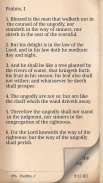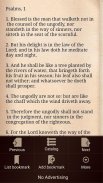




Bible - Psalms

Bible - Psalms介绍
Psalms
The Book of Psalms (Hebrew: תְּהִלִּים or תהילים Tehillim meaning "Praises"), commonly referred to simply as Psalms or "the Psalms", is the first book of the Ketuvim ("Writings"), the third section of the Hebrew Bible. The English title is from the Greek translation, ψαλμοί psalmoi, meaning "instrumental music" and, by extension, "the words accompanying the music." There are 150 psalms in the Jewish and Western Christian tradition (more in the Eastern Christian churches), many of them linked to the name of King David, but his authorship is not accepted by most modern Bible scholars.
Benedictions and superscriptions
The Book of Psalms is divided into five sections, each closing with a doxology (i.e., a benediction) – these divisions were probably introduced by the final editors to imitate the five-fold division of the Torah:
Book 1 (Psalms 1–41)
Book 2 (Psalms 42–72)
Book 3 (Psalms 73–89)
Book 4 (Psalms 90–106)
Book 5 (Psalms 107–150)
Many psalms (116 of the 150) have individual superscriptions (titles), ranging from lengthy comments to a single word. Over a third appear to be musical directions, addressed to the "leader" or "choirmaster," including such statements as "with stringed instruments" and "according to lilies." Others appear to be references to types of musical composition, such as "A psalm" and "Song," or directions regarding the occasion for using the psalm ("On the dedication of the temple," "For the memorial offering," etc.). Some carry the names of individuals, the most common being David, and thirteen of these relate explicitly to incidents in the king's life.
Overview
Individual psalms were originally hymns, to be used on various occasions and at various sacred sites; later, some were anthologised, and might have been understood within the various anthologies (e.g., ps.123 as one of the Psalms of Ascent); finally, individual psalms might be understood within the Psalter as a whole, either narrating the life of David or providing instruction like the Torah. In later Jewish and Christian tradition, the psalms have come to be used as prayers, either individual or communal, as traditional expressions of religious feeling.
诗篇
这本书的诗篇(希伯来语:תְּהִלִּים或תהיליםTehillim意为“赞美”),通常简称为诗篇或“诗篇”,是Ketuvim的第一本书(“文”),希伯来圣经中的第三部分。英文标题是从希腊文翻译,ψαλμοίpsalmoi,意思是“器乐”,并推而广之“的字样伴随音乐。”有150诗篇在犹太和西方基督教传统(多在东部基督教堂),许多人挂大卫王的名字,但他的著作不接受最现代的圣经学者。
祝福和superscriptions
这本书的诗篇分为五节,每节结束以颂赞(即祝福) - 这些分歧,很可能是最后的编辑介绍给模仿圣经的五倍师:
书1(诗篇1-41)
第2册(诗篇42-72)
第三册(诗篇73-89)
第四册(诗篇90-106)
第5册(诗篇107-150)
许多诗篇(150 116)有个别superscriptions(职称),从冗长的注释来一个字。超过三分之一似乎是音乐的方向,给“领导”或“唱诗班指挥”,包括与这些陈述为“与弦乐器”,“根据百合花。”其他人似乎是引用类型的音乐作品,如“的诗”和“歌”,或有关的场合使用诗篇方向(“关于寺庙的奉献”,“为了纪念祭”等)。一些携带个人的名字,最常见的是大卫,而这些13明确涉及到的事件在国王的生活。
概观
个别诗篇原本是赞美诗,可在不同的场合和不同的圣地使用;后来,有些人anthologised,并有可能被理解的各种文集(例如,ps.123作为晋的诗篇之一)之内;最后,个人可能诗篇诗篇作为一个整体内被理解,无论是叙述大卫的生命或提供指令,如律法。在后来的犹太教和基督教的传统,诗篇都来用作祈祷,无论是个人还是集体,为宗教感情的传统表现形式。

























